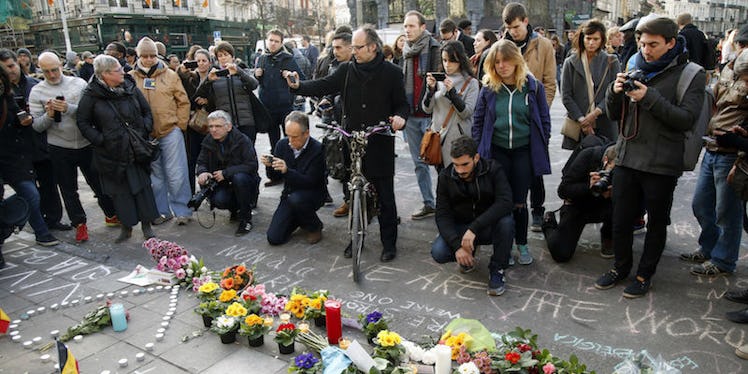
What It's Like To Make Sense Of The Attacks, As Told By A Brussels Resident
Have you ever seen yourself or somebody you know on TV?
The strange feeling of seeing something familiar through an unfamiliar lens usually evokes positive sensations from within our bodies.
Being able to point to a TV and say, "I have been there," is pretty cool. But today, a very familiar place to me was all over the TV. I grew up just a short distance from Brussels. Whenever I fly home, I fly into Brussels Airport. I took the Brussels subway many times, and got off at Maelbeek to check out the EU government buildings.
Today, all of these places were on TV, but I did not point to the screen in excitement. Instead, the finger that would have been pointing was wiping tears off my face because that familiar place had become a sight of terrorism. For the first time ever, I was unhappy to see my home on TV.
These familiar places were distorted by destruction and people in shock, running and screaming. That is not the Brussels we know. Still, the images that are familiar yet foreign to someone makes him or her feel more involved in the story.
I have stood where they stood. I know people who frequent these places every day. In fact, one of my friends was on his way to Brussels Airport when the news of the explosions prevented him from traveling further.
As a result, the familiarity of these places causes one thought to creep up in my mind: It could have been me. While I realize people die tragically every day and no life is more important than another, it is days like today that make me realize how quickly everything could be over.
There is an existing chance I could have lost somebody I know today. If that is the case, the news has become connected to my life. I therefore spend more time on the Internet getting updates. I watch more TV. I simply need the information about newest developments today more than on days when a place I have never been to is the hot topic.
The media is a business that sells a product, and today's supply and demand is influenced by my peers and I. We simply care more today because our lives could have directly been impacted and forever changed.
Is this wrong? Maybe. Is it natural? Absolutely. We tend to care more about the things directly connected to our lives.
Maybe cancer research is not on our minds on a daily basis, but as soon as a loved one has cancer we check latest developments. We may have never looked into Buddhism, but when the Dalai Lama is in our vicinity, we can't help but to find out what he's all about.
Today is no different: Terrorism has likely reached my neighborhood and it impacts my life. I may not be more scared of terrorism than I was before, but I can no longer claim to be unaffected by it. It could happen every day, everywhere and there's almost nothing we do can stop it.
Brussels was aware of the threat. The capture of Salah Abdeslam on Friday afternoon had the city on alert of retaliation, and yet it was possible for terrorists to plant three bombs in public places and detonate them.
The surrounding areas of Brussels — including my family's house two hours away from the city — are now circled by helicopters. Everyone must stay inside. The streets are deserted, and the people of Europe are scared.
Brussels is often the center of attention, but today I wish it was not. From now on, tourists will come to Maelbeek station in Brussels and say, "I've seen this place on TV," for the wrong reasons.